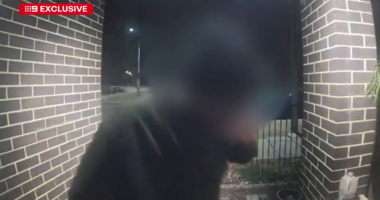Share this @internewscast.com
President Donald Trump delivers remarks after signing a law that nullifies California’s regulation prohibiting the sale of new gasoline-powered vehicles by 2035. This event took place in the East Room of the White House on Thursday, June 12, 2025, in Washington (AP Photo/Alex Brandon).
Following the historic U.S. Supreme Court decision that eliminated nationwide injunctions as traditionally understood, both plaintiffs and defendants are maneuvering for a favorable position in numerous cases where policies from the Trump administration were halted.
In a Wednesday filing, a Congolese refugee known by the pseudonym Pacito insists the high court’s ruling has no impact on their case.
The seven-page motion requests U.S. District Judge Jamal Whitehead, appointed by Joe Biden, to maintain an injunction issued in late February. This injunction prevents the Trump administration from making efforts to “dismantle” the nation’s refugee resettlement framework.
“Although the Court has jurisdiction to enforce its preliminary injunctions ‘to preserve the status quo’ — including by taking steps to ensure Defendants’ compliance with the injunctions as ordered — it no longer has jurisdiction to narrow the scope of its previously granted relief because doing so would ‘materially alter the status of the case on appeal,'” the supplemental briefing argues. “Regardless, no such narrowing is needed.”
Love true crime? Sign up for our newsletter, The Law&Crime Docket, to get the latest real-life crime stories delivered right to your inbox.
The case stems from President Donald Trump’s efforts to suspend the U.S. Refugee Admissions Program (USRAP) for 90-day intervals “until such time as the further entry into the United States of refugees aligns with the interests of the United States.” The plaintiffs, in their lawsuit, said the 45th and 47th president’s executive order counsels a stark violation of federal law. The judge, so far, has agreed.
On June 27, the plaintiffs were compelled to make their latest argument by Whitehead — in response to the Supreme Court’s ruling that same day in the case stylized as Trump v. CASA, the birthright citizenship-adjacent decision which was decided along partisan lines.
All six Republican-appointed justices voted to rein in the power of the judiciary branch in favor of the executive; all three Democrat-appointed justices would have maintained the decades-old state of affairs in which district courts had the power to block executive action with the use of “universal,” or nationwide, injunctive relief.
In the present case, the plaintiffs say the previously-granted injunction cannot be tinkered with — because the case is currently before the U.S. Court of Appeals for the 9th Circuit. Still, the brief argues the lower court should continue to enforce its injunction.
“As a threshold matter, the Court retains jurisdiction to enforce its preliminary injunctions to preserve the status quo, but it no longer has jurisdiction to narrow the scope of previously granted relief based on the Supreme Court’s decision in CASA,” the brief argues.
To hear the plaintiffs tell it, the CASA decision left undisturbed prior case law which removes jurisdiction from district courts once an appeal is filed. And, since the government appealed in late March, the plaintiffs say the court can only enforce what is already on the books.
Moreover, the plaintiffs accuse the government of noncompliance with that prior order — and they allege this noncompliance began well before the Supreme Court issued its ruling in the CASA case.
The government, for its part, urged Whitehead to await guidance from the 9th Circuit and to reject the claims of non-compliance in their own seven-page supplemental brief. They also chided the court for what they believe to be an injunction not long for this earth.
“The universal injunctive relief granted by this Court is overbroad, unnecessarily extending far beyond the parties involved,” the defense brief reads. “The Supreme Court confirmed as much in CASA, concluding that injunctive relief must be limited to the named plaintiffs in the specific case.”
The plaintiffs also have a separate, but related argument: their relief was granted to a group of refugees who made up a would-be class.
Notably, a concurrence by Justice Brett Kavanaugh in the CASA opinion held open the possibility of using class actions to obtain relief similar to that once provided by nationwide injunctions.
“To be sure, in the wake of the Court’s decision, plaintiffs who challenge the legality of a new federal statute or executive action and request preliminary injunctive relief may sometimes seek to proceed by class action under Federal Rule of Civil Procedure 23(b)(2) and ask a court to award preliminary classwide relief that may, for example, be statewide, regionwide, or even nationwide,” Kavanaugh opined.
And, here, the plaintiffs latched onto that concurrence as determinative – like many others have done and likely will do.
From the brief, at length:
CASA is also inapposite because this case involves relief granted to putative class members. The CASA Court rejected the respondents’ counterargument that universal injunctions were analogous to bills of peace, explaining instead that the “modern form” of the bill of peace is “the modern class action” governed by Federal Rule of Civil Procedure 23. Because the procedural requirements of class actions are “virtually identical” to those of the bill of peace, class actions have a historical pedigree and therefore fall within a federal court’s equitable authority under the Judiciary Act. Cases involving a certified class might very well require nationwide relief.
Finally, the plaintiffs insist they are on trebly firm ground because some of their claims were raised under the Administrative Procedure Act (APA), the federal statute which governs agency action.
In CASA, the plaintiffs note, the majority opinion by Justice Amy Coney Barrett explicitly says the court has not addressed the “distinct question” of whether the APA “authorizes federal courts to vacate federal agency action.” And, since the plaintiffs alleged four separate APA violations, they say the court can freely disregard the CASA ruling for that reason as well.
“The Court has jurisdiction to enforce its preliminary injunctions to preserve the status quo, but it does not have jurisdiction to narrow the scope of its preliminary injunctions (such as by limiting the scope of relief in light of CASA) because doing so would “materially alter the status of the case on appeal,'” the Pacito brief concludes. “Regardless, the Supreme Court’s CASA decision does not affect the permissibility of prior or future relief in this case because it involves relief granted to putative class members under the APA and such relief is necessary to provide complete relief to Plaintiffs.”
















